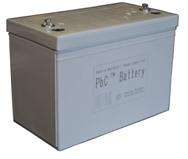January 11, 2012 report
Axion sees future in lead-acid-carbon hybrid battery

(PhysOrg.com) -- Energy storage continues to be the number one question mark in discussions about the grid. We can gather enough energy from sun and wind systems but engineers still scratch their heads over the best materials and processes in which to store the energy. Lead batteries have figured low on the wish list for smartest solutions. One energy watching web site has put it politely, describing lead batteries as a temperamental child having “dubious merit.”
But Axion Power, a New Castle, Pennsylvania, company, is talking up a storm about their unique way of putting lead at the top of the list, especially regarding discussions about energy storage for the grid.
Axion is aggressively telling customers, customer prospects and the grid-erati at large that their lead-carbon batteries and energy storage systems represent the best value/performance fit for battery energy storage applications.
Axion is the developer of lead-carbon (PbC) batteries, which are giving new respectability to the utterance of the word “lead.” Its product incorporates the lead acid battery structure--same case, cover, separator, electrolyte and positive plate—but with something proprietary. The PbC battery is a combination of conventional lead-acid battery lead-dioxide positive electrode with a proprietary activated-carbon supercapacitor-like negative electrode.
According to reports, Axion has been able to improve the durability and charge rate while reducing weight over the typical lead battery by 30 percent. One advantage that Axion points to is the battery’s fast rate of charge--minutes or even seconds depending on the application. Another advantage the company points to is that its PbC batteries are fully recyclable and a fraction of the cost of non-recyclable chemistries.
Axion CEO Tom Granville, summing up the strengths of his business, said that companies have always been talking about storage as an important component but the problem “has been that the storage is either too expensive or that it requires too much maintenance. Our battery fits in the middle of that.”
Latest reports are that Axion Power is making the right impressions. A press release was sent out earlier this month reporting that Axion was awarded a purchase order from SilTek Inc. confirming participation in a Zero Energy Building in the Washington DC Naval Yard. Axion will provide an array of its batteries, electronics and battery management system that represents its "mini-Cube" concept based on scalability of its primary PowerCube. (The PowerCube is essentially a shipping container packed with electronics and Axion’s batteries. The PowerCube integrates the batteries, power electronics, safety systems and computer controls into a complete module.) The mini-Cube will provide demand response energy storage that will be grid network tied, will be linked to a 32kW solar panel array and will supply standby power service for this Zero Energy Administration Building.
The project is underwritten by the US Navy. The purchase order calls for Axion's work to begin in January with the full 36 PbC battery mini-PowerCube system to be completed in the first quarter of 2012. The principal contractor for the project is SilTek.
CEO Granville said it was a significant step forward; it comes on the heels of November's integration of his company’s PbC PowerCube onto the PJM network, a transmission organization to ensure the reliability of the high-voltage electric power system serving people in 13 states and the District of Columbia.
© 2011 PhysOrg.com




















